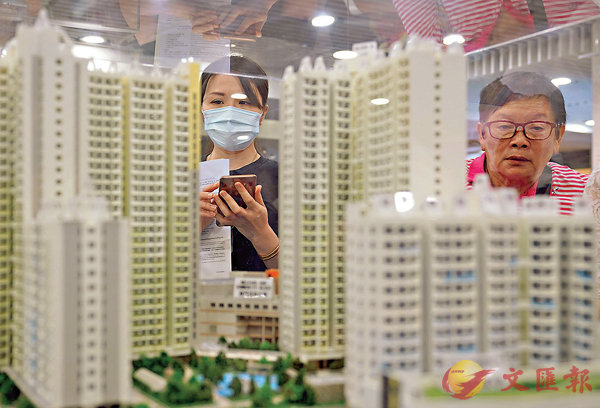 ■政府將推動徵收房屋空置稅。 資料圖片
■政府將推動徵收房屋空置稅。 資料圖片【原文】空置稅條例草案9月13日刊憲,獲得不同黨派支持,地產建設商會則認為,現時市況推空置稅會加劇樓價下調,呼籲政府暫緩。本港近期受本地反修例風波和中美貿易糾紛打擊,樓市的確出現回落跡象,但樓價調整幅度仍小,落實空置稅值得支持。面對社會深層次矛盾,地產商必須顧全大局,考慮社會整體和長遠利益,加快推售樓盤滿足市場需求,特區政府更積極考慮所有可以增加土地房屋供應的選項。
過去香港一直沒有政策規管發展商賣樓進度,私人樓宇建成後,發展商可以擠牙膏式分批出售,過程動輒以年計算。運房局數字顯示,本港空置一手樓數目由2013年3月底約4,000伙,增加至今年6月底突破1萬伙,是2008年以來最高水平,足見空置問題日益嚴重,是本港樓價居高不下的主要原因之一。
政府建議獲發入伙紙達12個月的一手樓須每年向政府申報單位狀況,須繳交額外差餉,可加快發展商賣樓進度,提升樓市流轉的效率。不同黨派均支持開徵空置稅。從初步效果而言,空置稅條例一刊憲,各大發展商隨即爭相推盤清貨,可見對打擊囤積居奇確有效果。
發展商要求政府暫緩的理據,是近月本港樓市氣氛轉淡。但觀乎最新公佈的樓價指數,只是較上月累積下跌1%至2%,仍在高位徘徊。正如財政司司長陳茂波所指,這種有秩序的調整完全不是問題。如果因為樓價輕微回調,就暫緩空置稅,只會向市場釋放錯誤的信息,認為政府刻意推動高樓價政策,刺激樓市進一步上升。
事實上,香港樓價長期高居全球首位, 國際公共政策顧問機構Demographia發表2018年全球樓價負擔能力報告,香港已經是連續第九年成為全球最難負擔的地方,樓價對家庭收入中位數比例進一步惡化,由2017年的19.4倍上升至20.9倍,即是說要不吃不喝不消費20.9年才能買樓,再次成為該調查歷來最高水平。以全球而言,排在香港之後最難負擔城市為溫哥華以及悉尼,兩地樓價對入息中位數比例是12.6倍及11.7倍。香港是20.9倍,水平遠超其他城市。高樓價令市民的生活質素每況愈下,年輕人上樓艱難,導致民怨,已成為影響香港社會和諧穩定的「計時炸彈」。
特區政府更應該主動作為,壓抑過高的樓價,緩解社會矛盾。發展商不能只是在商言商、只顧業界的利益,更要考慮全社會的利益,對年輕人、對香港的未來負責。
除了私人住宅單位供應短缺,本港公營房屋亦缺6.7萬個單位。釋放土地、加快建屋不能再拖。日前有政黨建議政府引用《收回土地條例》,徵收土地興建公屋,獲得主流民意支持。行政長官林鄭月娥亦強調政府增加房屋供應的措施只會陸續有來,絕不走數。市民期待社會凝心聚力,用盡一切可行方法,滿足市民居住需求,建設宜居、快樂的香港。(摘錄自香港《文匯報》社評14-9-2019)
Proposed vacancy tax in line with long term interests of Hong Kong
【譯文】The vacancy tax bill gazetted on 9-13-2019 has been well received by various political parties. However, the Real Estate Developers Association of Hong Kong urged the government to withhold the bill, as they fear the move would add fuel to the fire amid the downward trend for property prices. Affected by the anti-extradition protests and the Sino American trade war, the local property market did show signs of downward adjustment. However, the extent of such an adjustment is still limited. The vacancy tax bill is still worthy of support. In the face of deep-rooted social conflicts, property developers must take account of the overall situation and the long-term interests of the society. Developers should speed up the pace of selling to meet market demands, and the SAR government should also proactively consider any options that could increase land and housing supply.
In the past, no measures have been put in place to regulate property developers' pace of flat sales. Like how toothpaste is squeezed out of the tube, private housing projects are often sold in batches, and it could take years to complete the sales of a housing project. According to official data from the Transport and Housing Bureau, the number of vacant new flats has more than doubled in five years - from around 4,000 units in March 2013 to over 10,000 units in June 2019. This record high number since 2008 shows that the severe vacancy problem is one of the major culprits of the persistently high home prices.
The government proposes that the first-hand building with a 12-month occupation permit should be reported to the Government on an annual basis. Additional rates should be paid to speed up the progress of the developers selling the flats and enhance the efficiency of the property market. Different parties such as the DAB support the levy of vacant taxes. From the preliminary results, the vacant tax regulations were gazetted, and the major developers immediately rushed to release the goods. This shows that it is indeed effective in combating hoarding.
According to government proposals, property developers of first-hand private residential units with occupation permit issued for 12 months or more must report annually to the government the status of these units. Special rates will be collected (if the units have not been rented out for more than six months). The proposed measure could speed up new flats' sales and enhance the efficiency of the property market's flow, and was well received among local political parties. As property developers scrambled to offload stock after the vacancy tax bill was gazetted, the new measure has proven to be effective in tackling land hoarding.
The rationale for property developers in asking the government to shelve the vacancy tax bill is that the property market in Hong Kong has turned weak in recent months. However, according to the latest property price index, there is only an accumulative drop of 1-2 per cent from the previous month. Home prices overall still remain high. As Financial Secretary Paul Chan Mo-po said, the adjustment has been in an orderly manner, and is not a problem at all. If the vacancy tax bill is withheld just because of a slight adjustment in property prices, it will only send out a wrong signal to the market that the government maintains a policy of high property prices, and is therefore deliberately pushing up property prices.
Hong Kong has long been the world's least affordable city in the world in terms of housing. In the 15th Annual Demographia International Housing Affordability Survey, Hong Kong was ranked the least affordable city in the world for the ninth year in a row. Average home prices rose from 19.4 times the gross annual median household income in 2017 to a record high of 20.9 times in 2018, meaning that it would take an average household 20.9 years to be able to afford an apartment if there were no other expenses. The house price-to-income ratio of the next two least affordable cities around the world after Hong Kong, namely Vancouver and Sydney, are 12.6 and 11.7 respectively. At 20.9, the ratio of Hong Kong is way higher than its counterparts. With the persistently high property prices, the quality of life of the Hong Kong people has been deteriorating, and Hong Kong's youth has found it nearly impossible to own a home. The resultant social discontent has now become a ticking time bomb that adversely affects the social harmony and stability of Hong Kong.
The SAR government should take a more active stance to bring down the property prices in order to ease the conflicts in our society. Meanwhile, property developers should not only consider their industry's business interests, but also the interests of the whole society. They should also be responsible for our young people and the future of Hong Kong.
Apart from private residential units, there is also a shortfall of 67,000 public housing units in Hong Kong. There is no time to lose in releasing land for housing. A Recent suggestion from local political parties that called for the government to invoke the Lands Resumption Ordinance to take back hoarded lands for public housing has been well received by the public. The Chief Executive Carrie Lam Cheng Yuet-ngor has also promised that the government's measures to tackle housing shortage will keep coming. It is hoped that the society will come together to do whatever it takes to fulfil every Hong Kong citizen's living needs, and build a more liveable and happier Hong Kong.■Jeffrey Tse
Q&A
1. 地政總署
2. 差餉物業估價署
3. 差餉
4. 地租
5. 土地註冊處
Answer
1. the Lands Department
2. the Rating and Valuation Department
3. rates
4. government rent
5. the Land Registry

